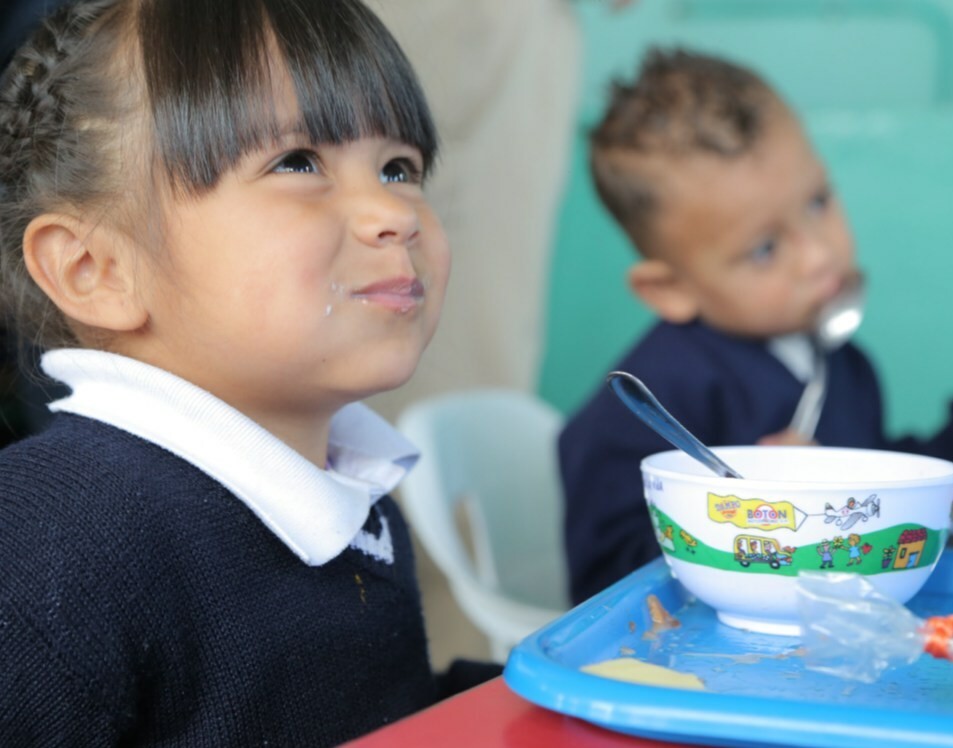School Breakfast and Social-Emotional Health
Research: School breakfast programs build sense of community

Students find school breakfast programs build sense of community, says the latest research on school breakfast programs commissioned by Kellogg Company Fund, building on previous studies that measured the impact of these programs.
As students and families prepare to head back to school this fall, many schools across the country will be working to expand participation in the National School Breakfast Program – and for good reason.
About 15 million students participate in the program annually, and research has long shown that these students eat a breakfast of higher nutritional quality than students who eat breakfast elsewhere. Now there’s research to show school breakfast has more benefits that positively impact children beyond providing important nutrition.
Kellogg Company Fund recently unveiled its latest round of research on school breakfast programs that shows the social-emotional impact these programs can have on children, such as improved classroom behavior, positive impact on mood and the development of social skills.
The research, commissioned by Kellogg Company Fund, one of the company’s charitable arms, sought the opinion of students in breakfast programs in five countries, including the US, and showed that these programs are spaces where students can build a sense of community, which in turn gives them a sense of security and identity that supports their social development. In addition, it supported findings in previous studies in which areas where breakfast programs are well established emphasize community building as the most beneficial impact of the program.
Overall, school breakfast programs offer children much more than nutritious meals. They are vital in building a sense of community, giving children time to interact and build friendships. Children feel a sense of belonging and togetherness in a supportive environment where everyone is included. School breakfast programs help improve attendance rates, with children excited about going to school to eat breakfast with their friends. Children learn about diversity and develop empathy as they engage with classmates from different backgrounds and grades.
AFHK partner schools have seen similar results from their participation in breakfast and other meal programs. 75% of partner schools in 2022 agreed that students demonstrate effective communication with peers during snack and mealtimes, respect differences in body shape and culinary preferences, and actively stand up against weight-based bullying, teasing, or food shaming.
Schools are also effectively using breakfast as a time to engage parents and caregivers, and share tips on how to make healthier meals at home. At Gilbert Elementary School in Irving, TX, AFHK Family Connector Bethlyn Fisher worked with the school to host an ‘All Pro Dads’ event, where staff met with male guardians and their children during breakfast. Fisher and the school’s health and physical education teachers gave a presentation on the importance of perseverance during conflict in relationships. They also gave a demo for the families on how to create an inexpensive, nutritious, and delicious breakfast of yogurt, granola, and in-season fruit.
The report from Kellogg also includes several recommendations on how to make the most of your school’s breakfast program, such as:
- Relaxed teachers: Allowing children to be more playful with each another and their teachers is beneficial as some children can feel repressed during the school day, especially as curricula become increasingly difficult as they advance through schooling.
- Safe spaces: Creating a safe environment where children feel supported opens up the floor for their individual needs to be addressed and monitored in a non-intrusive manner. In particular, the monitoring of eating disorders has been experienced as less triggering from the perspective of children, who tend to feel more comfortable opening up to teachers on matters they might otherwise withhold.
- Consistency: School breakfast programs are a vital source of stability for children who may be experiencing turbulent family backgrounds. It is recommended to incorporate a steady routine. For example, a consistent weekly food menu positively impacts children, and the sense of familiarity and structure has a calming effect on many. The desire to go in for breakfast also improves school attendance.
Check out the full report for more findings, quotes, and recommendations.
As a long-time supporter of Action for Healthy Kids, Kellogg Company partnered with AFHK in 2022 to expand our comprehensive, digital bilingual resource library. Featuring more than 250 free activities, tip sheets, and videos in both English and Spanish, the digital bilingual resource library is designed to offer activities that require little or no preparation to accommodate the busy schedules of families and educators. Users can filter the resource library by program, language, location, or activity type, and download resources directly from the site. Visit the Digital Resource Library here.